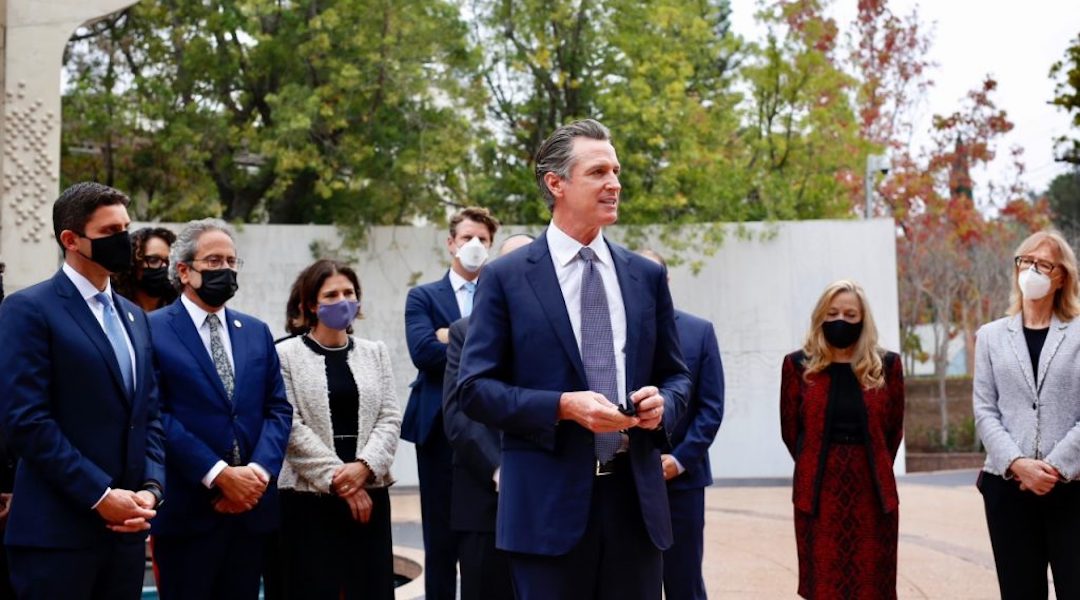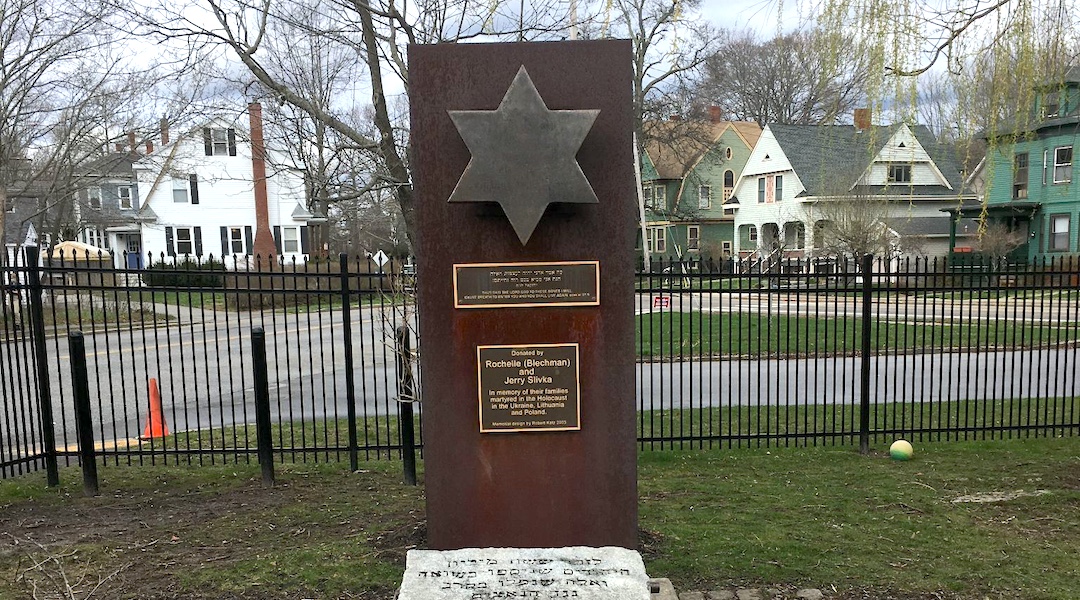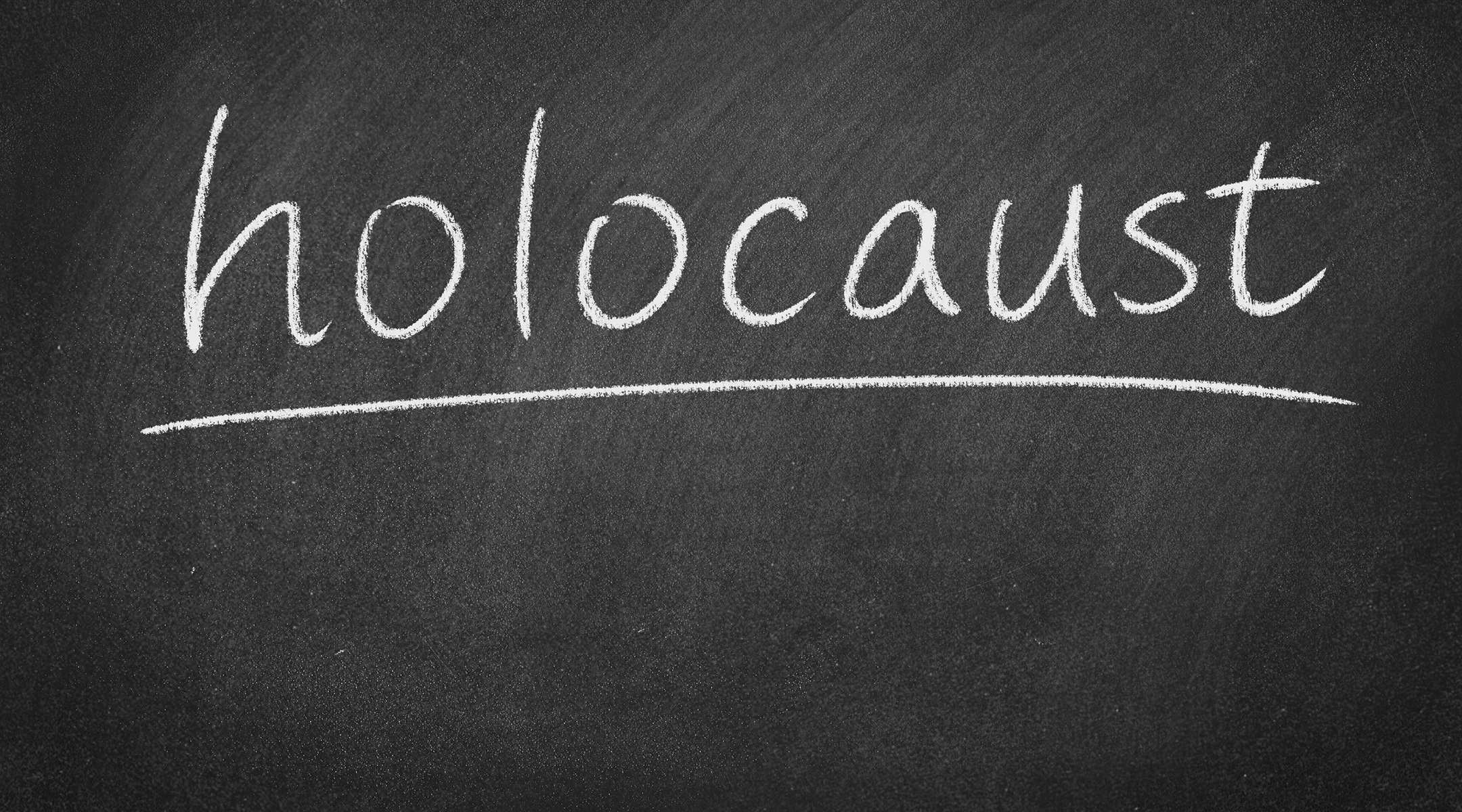This article was produced as part of JTA’s Teen Journalism Fellowship, a program that works with Jewish teens around the world to report on issues that affect their lives.
(JTA) — Framed postcards from my great grandmother, Leah, line the walls of my grandmother’s sitting room. Leah received the letters after immigrating to America in the 1920s. She voyaged alone as a teenager, leaving her family of eight and her village of Preili, Latvia behind. One day, the postcards stopped coming. The Nazi Einsatzgruppen killed the entire Jewish population of her village, an estimated 1,500 people.
Even as a young child, I knew of the inherited trauma shared among Jewish people. My Jewish elementary school, Levey Day School, located a block from my house in Portland, Maine, was a bubble of pluralism. A Holocaust memorial sits on one corner of the campus, and I knew its significance.
When I entered public middle school, I was, for the first time, surrounded by people lacking the generational memory of the Holocaust. The slights I encountered there, which continued into high school, reflected the absence of Jewish representation: I was required, on multiple High Holidays, to attend school for exams; once, a friend accosted me for “only ever talking about being Jewish.” Education focused on the Holocaust was largely absent.
I wasn’t the only one who noticed this shortfall in the curriculum. Five years ago, Maine’s legislature passed a law that required teaching of the Holocaust, along with Maine studies and African American history, in public schools. Maine is now among the 40 states in the U.S. that have legislation regarding Holocaust education in public schools, according to Echoes and Reflections, a partnership that supports Holocaust education.
Do such laws really work? I spoke to a few students who live in one of these 40 states with Holocaust education mandates. In schools that seriously prioritize abiding by such mandates and including diverse perspectives in their curriculum, students feel their peers are less likely to speak insensitively about the Holocaust and Jewish people.
However, where schools largely ignore the states’ Holocaust education suggestions, students observed peers speaking and acting more often from ignorance or bias.

California Gov. Gavin Newsom announces the formation of a Council on Holocaust and Genocide Education at the Museum of Tolerance in Los Angeles, Oct. 6, 2021. (Governor Newsom’s office)
For as long as he can remember, Jonathan Primus, 13, has attended the Beth Israel Congregation, in Ann Arbor, Michigan, where a group of anti-Israel protestors demonstrate on the sidewalk every Shabbat. They carry signs denying the Holocaust, condemning Zionism and supporting antisemitic conspiracy theories.
Primus understood from a very young age that antisemitism is pervasive. He has Holocaust survivors in his own family, learned about Jews’ history of facing persecution from his parents, and discovered his Jewish identity at his elementary Jewish day school.
Once Primus entered middle school, however, the Holocaust education he and his non-Jewish peers received was largely limited to memorizing names and dates. Primus says that if people knew more about this historical event which “had a really terrible impact on humanity and society, they’d probably be less likely to engage with the kind of” antisemitic rhetoric that his synagogue confronts each week.
Reports of persistent and growing anti-semitism in the U.S. and beyond have led Primus to believe that Holocaust education should be included in schools’ curriculum along with coverage of current events. He says that educators need to show that “these things are still happening in the world,” that the messages from back then are still spreading.
Avi Greene, 17, lives in Richmond, Virginia, where a 2009 law required that the all schools be provided with a teacher’s manual on Holocaust education. Greene said that despite this, his high school had minimal Holocaust instruction built into the curriculum. In his English class they discussed the literary aspects of Elie Wiesel’s “Night,” but ignored the history and current relevance of its themes.
Greene wishes the Holocaust and antisemitism were addressed with as much care as other social issues. His school hosts a guest speaker monthly to discuss topics relevant to students like racial inequity and the importance of representation in government. Greene said the program has had a real impact, but that it is critical for all injustices to be understood. He’d like his school to shed light on Holocaust denial and misinformation as well. Having guest speakers in particular, he says, is an ideal way of “helping another people to feel heard.
By contrast, Hannah Mahboubi, 18, credits the meaningful coverage of the Holocaust at Beverly Hills High School for the lack of antisemitism she has observed. California, where Jews make up 3 percent of the population, mandated Holocaust education in 1985. This year, Mahboubi’s school, which has a large Jewish population, brought in Jewish survivors and activists as guest speakers in response to the rise in antisemitism since the the war in Israel started. Mahboubi says it’s important to provide people with information about the Holocaust but that it needs to come from “reliable sources and reliable people” in order to convey the emotion that accompanies the facts.

The Holocaust memorial at the Levey Day School in Portland, Maine. (Courtesy)
Even in an area with a considerably smaller Jewish population than Beverly Hills, Jillian Lieberman, a freshman at Holland Hall High School in Tulsa, Oklahoma, learned about the Holocaust from a young age through Hebrew school and her family. Her eighth-grade curriculum included an in-depth unit on the Holocaust. Following the unit, she said, people made fewer jokes and addressed the subject more respectfully.
Oklahoma’s law went into effect last school year. The Jewish population of Oklahoma makes up just 0.1% of the state’s residents, ranking 48th in the country.
In my state, the bill mandates the inclusion of Holocaust education in Maine’s learning standards. The Department of Education conducted a review of these standards in the summer of 2023, revising them to reflect the new bill. Once this part of the law was carried out, all responsibility for incorporating new curriculum fell independently to schools.
Maine’s Commissioner of Education, Pender Makin, said that unlike Massachusetts or Vermont, Maine’s constitution guarantees various municipalities the right to manage curriculum on a local level. Laws like the Holocaust eduction mandate, she explained, actually “don’t have any legislative authority at the Department of Education level.”
Instead, enforcement is up to local school boards and, often, to individual teachers. Because several curriculum-related laws were passed in recent years, Makin said, teachers and school boards may have had to make sacrifices, overlooking some standards in favor of others. As a result, Holocaust education can be easily neglected.
Eli Tuchinsky’s experience suggests why Maine’s schools could benefit from a Holocaust mandate with real teeth. At his middle school in Portland, Maine, Tuchinsky witnessed two of his peers making a Heil Hitler salute. They assured him that they didn’t mean it “in that way.” Eli blames the lack of education, in part, for this kind of incident.
Matthew Bernstein, a social studies teacher at Portland’s Casco Bay High School, said that the lack of context, the “true absence of knowing,” leads students to make comments or scribble a swastika on their papers. “I think that’s where education becomes so powerful,” he said. “Without context, you see this symbol and don’t know what it really means or connects to.”
The work of educators who have prioritized teaching the Holocaust shows that the most impactful lessons come from those with direct connections to the history. Anna Wrobel, a historian, poet and educator in Falmouth, Maine comes from a family of refugees similar to my own. Wrobel took lessons in combating antisemitism from her immigrant parents, Jewish history and the Holocaust into the classroom with her. Still, years later, she gets messages from former students. They say that learning about the Holocaust with her was one of “the most important steps in their educational careers.” It taught them “what it meant to be a human being,” she said.
As the stories of survivors retreat further into the past, preservation of the lessons they convey becomes the responsibility of a new, young generation. When schools prioritize giving students direct and tactile connection to the tragedies of the Holocaust, they preserve the dignity of victims. As one student noted in her testimony in support of Maine’s Holocaust education bill, “It is our job to continue to better the world, and to do this we must be educated about the horrors the world has created, is creating, and will continue to create if we don’t stop it.”
JTA has documented Jewish history in real-time for over a century. Keep our journalism strong by joining us in supporting independent, award-winning reporting.






